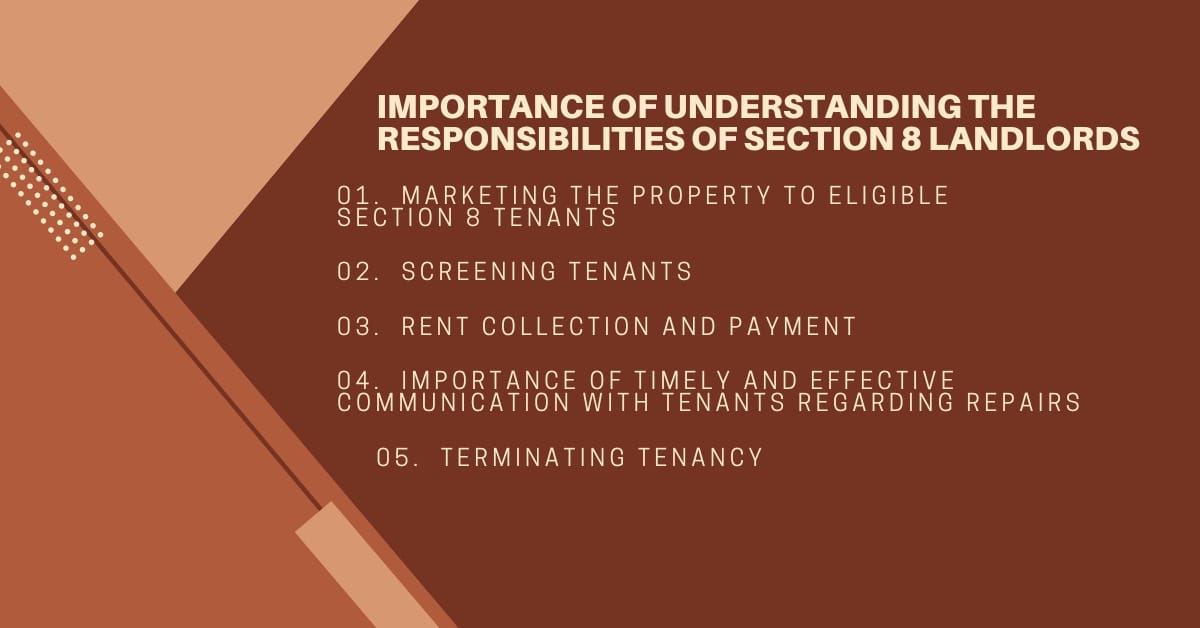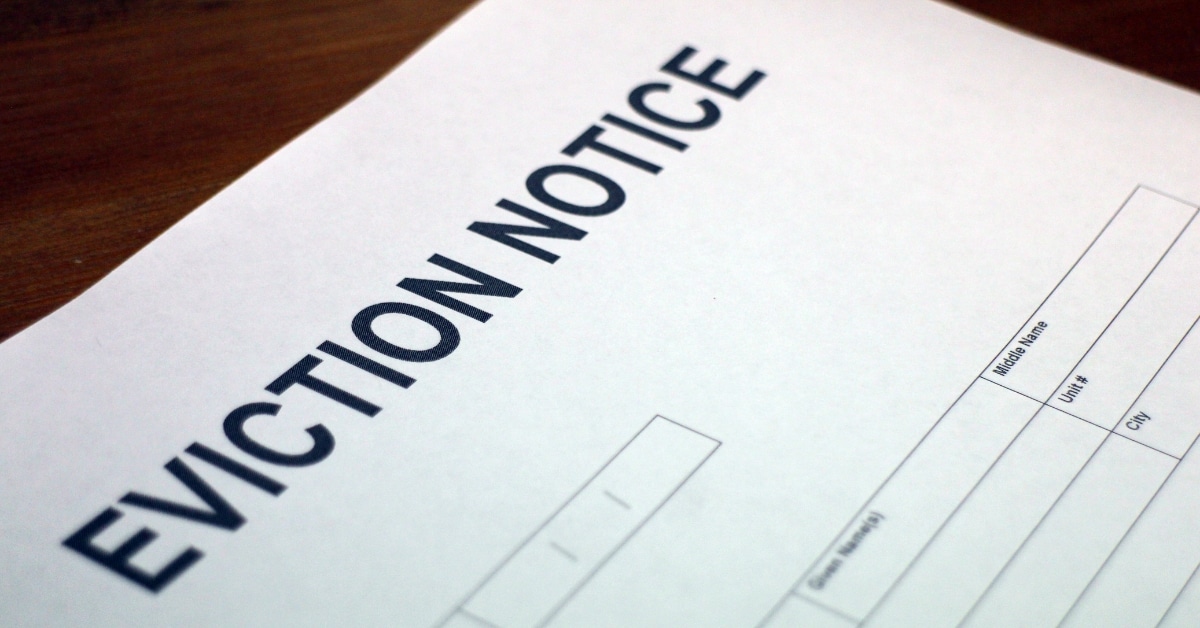As a Section 8 landlord, it’s important to understand and fulfill your responsibilities to provide safe and decent housing for tenants. This includes advertising the property in an accessible and inclusive manner, verifying tenant eligibility through the screening process, and maintaining the property according to regulations.
Are you considering becoming a Section 8 landlord? If so, it is important to understand the responsibilities associated with this type of rental property. From marketing the property to eligible tenants and eviction processes, there are many factors that landlords must take into consideration when operating a Section 8 rental unit.
Importance of Understanding the Responsibilities of Section 8 Landlords
Understanding the responsibilities that come with being a Section 8 landlord can provide a number of benefits to both the landlord and potential tenants.
By familiarizing themselves with the voucher program guidelines, landlords are able to maximize their rental incomes while providing safe, quality housing for qualified individuals who may not be able to obtain it without assistance.
Additionally, understanding Section 8 regulations help landlords protect themselves by avoiding nonpayment issues as well as helping them comply with applicable state and federal laws. Landlords have an important role in promoting successful outcomes for tenants and should prioritize taking the time to learn more about the responsibilities that come with being a Section 8 landlord.

Marketing the Property to Eligible Section 8 Tenants
Understanding the requirements for advertising
Advertising property to eligible Section 8 tenants requires expertise and skill, as there are numerous regulations that must be adhered to. The Department of Housing and Urban Development (HUD) provides guidance on the conditions which must be fulfilled when advertising for people with Section 8 housing choice vouchers.
This includes making sure you place your advertisement in multiple locations, specify participation in the HUD programs, maintain records of each advertisement, and provide receipts to voucher holders where necessary. To make this an easier process while still ensuring compliance, seeking help from experienced professionals who can provide answers or give advice is often a beneficial step.
Doing so will ensure that each step taken is done correctly and efficiently which increases the chances of successful results.

Providing accessible and inclusive advertising options
Creating accessible and inclusive marketing options for Section 8 tenants can make all the difference when advertising a property. Highly visible ad placements such as billboards and public transport buses are ideal for reaching out to those who qualify for rental assistance.
Furthermore, it’s important to speak elegantly but effectively while emphasizing the amenities in order to attract potential tenants. With these considerations in mind, the effort that goes into providing accessible and inclusive advertising options is well worth it!

Screening Tenants
Considerations for Screening Applicants With Criminal Records
As a Section 8 landlord, it is important to take all criminal records into consideration when screening potential tenants. Criminal records can vary greatly in the severity of the infraction, the elapsed time since conviction, and the likelihood of recidivism.
Although performing a criminal background check on each applicant might be necessary to protect your property and other tenants, landlords should also observe any extenuating circumstances. It may be appropriate to consider rehabilitation efforts and incarceration lengths alongside more minor offenses before making a decision to deny an application.
This can serve as an opportunity to acquire beneficial qualities such as drive and motivation that could prove paramount in upholding the responsibilities carried out by a Section 8 landlord.

Understanding the role of the local housing authority in the screening process
Taking on the additional responsibilities of being a Section 8 landlord can be intimidating, and understanding the role of the local housing authority in the tenant screening process is central to making smart decisions.
The housing authority is responsible for determining the eligibility of potential tenants and making sure that they meet all criteria set out in the program. In addition, they undertake background checks and credit reports to make sure that only qualified tenants that meet specific standards are approved.
It is also important to remember that while landlords can look at other considerations when choosing tenants, the housing authority makes final decisions on who is accepted into the program.

Rent Collection and Payment
Understanding the Responsibilities of the Landlord and the Tenant
Being a landlord comes with a variety of rules and responsibilities when it comes to renting collection and payment in Section 8 housing. It is important to understand what these regulations require, as any violation can lead to serious consequences.
The landlord must collect the rent directly from the tenant on the first of each month and must also collect any late fees due, if applicable. In addition, they are responsible for informing their tenant of any changes or updates related to the rental agreement such as rule adjustments, financial statement deadlines, and other necessary tasks.
Finally, the landlord is expected to provide all necessary paperwork such as rent receipts, invoices, or other reports needed by federal government agencies or other organizations related to receipt and payment of rent.

Importance of maintaining accurate financial records and records of payments
It is critical for Section 8 landlords to maintain accurate financial records and records of payments, as this information is essential to monitor the performance of a housing unit. The financial records will allow landlords to ensure they are able to calculate infrastructure improvements and maintenance costs, while rent payment records serve as evidence that the tenant is meeting their housing obligations.
Furthermore, having accurate rent collection and payment information handy helps landlords keep up with the requirements for contract renewals and avoid any legal issues or audits associated with subsidies from government housing authorities.
Planning ahead with well-maintained financial records and payment records can help to maximize profits for the Section 8 landlord and ensure the smooth operation of the tenant’s unit.

Importance of Timely and Effective Communication With Tenants Regarding Repairs
For landlords overseeing Section 8 properties, proper and timely communication with tenants regarding repairs is paramount. Prompt attention to maintenance issues not only creates an environment where all parties are aware of the status of the property but also serves to increase tenant satisfaction and therefore maximize landlord income.
The successful landlord knows how to ensure that their Section 8 tenants’ concerns are heard and addressed without unnecessary delays. This can be done through regular emails, text messages, or letters informing tenants of key deadlines, upcoming inspections, or repair processes.
By providing clear lines of communication with tenants they show they care about both themselves and their property. Proper tenant-landlord relationships not only promote timely completion of needed repairs but also foster tenancy renewal which is a benefit to both landlord and tenant alike.

Terminating Tenancy
Understanding the role of the local housing authority in the eviction process
The local housing authority plays a critical role in the eviction process for terminating tenancy in Section 8 landlord responsibilities. Not only do they help landlords understand necessary laws and regulations, but most agencies will also actively provide assistance during proceedings when it comes to paperwork or obtaining court orders.
They can even provide access to free legal consultation if a dispute requires complex resolution or negotiation. By partnering with their local housing authority, landlords are able to find solutions that benefit both the tenant and landlord and adhere to specific protocols established by state and federal housing guidelines.

Importance of following local and state laws related to the termination of tenancy
As a Section 8 landlord, it is essential to be mindful of the local and state laws surrounding the termination of tenancy for your renters. Neglecting to follow the appropriate processes for terminating a tenancy may lead to hefty fines or even criminal charges.
Furthermore, not adhering to certain rules can sometimes invalidate an otherwise sound legal defense against an unhappy tenant’s allegation of wrongful eviction. Thus, it is crucial to know and understand the applicable laws in order to avoid any potential issues that could hinder your business operations.

In Conclusion
It is important for Section 8 landlords to take the time to understand their responsibilities and adhere to applicable regulations. From marketing the property in an accessible and inclusive manner, maintaining accurate financial records, and more. There are many factors that must be taken into consideration when operating a Section 8 rental unit.
Taking the time to understand these responsibilities can help landlords maximize their rental incomes, and protect themselves from legal issues related to the program. By doing so, Section 8 landlords can ensure that they are able to provide a safe and decent living environment for their tenants while meeting all applicable regulations governing the program.












